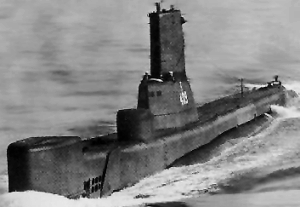USS Piper (SS-409)
 |
|
| History | |
|---|---|
| Builder: | Portsmouth Naval Shipyard, Kittery, Maine |
| Laid down: | 15 March 1944 |
| Launched: | 26 June 1944 |
| Commissioned: | 23 August 1944 |
| Decommissioned: | 16 June 1967 |
| Struck: | 1 July 1970 |
| Fate: | Sold for scrap, June 1971 |
| General characteristics | |
| Class and type: | Balao class diesel-electric submarine |
| Displacement: | |
| Length: | 311 ft 8 in (95.00 m) |
| Beam: | 27 ft 3 in (8.31 m) |
| Draft: | 16 ft 10 in (5.13 m) maximum |
| Propulsion: |
|
| Speed: |
|
| Range: | 11,000 nautical miles (20,000 km) surfaced at 10 knots (19 km/h) |
| Endurance: |
|
| Test depth: | 400 ft (120 m) |
| Complement: | 10 officers, 70–71 enlisted |
| Armament: |
|
USS Piper (SS/AGSS-409), a Balao-class submarine, was a ship of the United States Navy named after the piper.
Piper (originally named Awa) was laid down 15 March 1944 by the Portsmouth Navy Yard, in Kittery, Maine; launched 26 June 1944; sponsored by Mrs. Charles W. Wilkins; commissioned 23 August 1944, Commander Bernard F. McMahon in command.
Although built late in World War II, Piper completed three successful war patrols before the cessation of hostilities, operating as a life guard for plane strikes and as an advance picket for fast carrier task forces.
Piper began her war career on 25 January 1945, when she slipped out of Pearl Harbor as the leader of a five-ship wolfpack. Piper was joined in the wolfpack by Pomfret (SS-391), Bowfin (SS-287), Trepang (SS-412), and Sterlet (SS-392), known as "MAC's MOPS." The mission was an anti-picket boat sweep in preparation for carrier strikes on Honshū. After a short stop at Saipan, the pack arrived in the assigned area south of Iwo Jima 10 February. Three sweeps from 10 February to 13 February revealed no picket boats.
Piper spent the period from 15 February to 24 March off the south and southeast coasts of Honshū serving alternately on independent patrol and lifeguard duty for the then intensive B-29 and carrier strikes against Japan. On the night of 25 February, Piper found her first target. In a night surface attack, she sank an unidentified 2,000-ton vessel. The last four days before departure were spent guarding the approaches to Bungo Suido against a possible Japanese sortie on the badly-damaged carrier Franklin (CV-13).
...
Wikipedia
